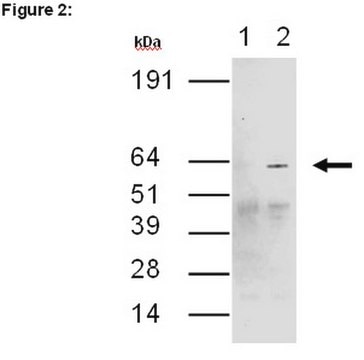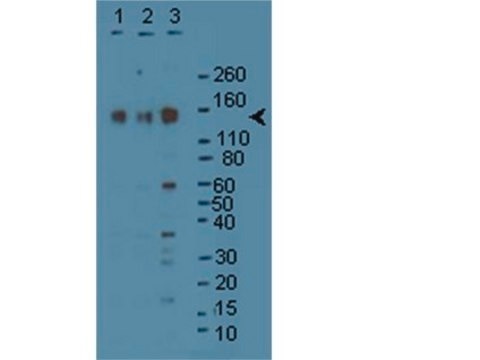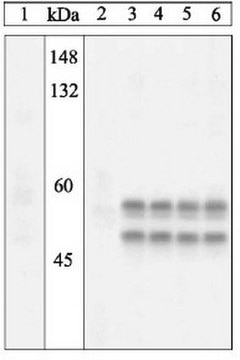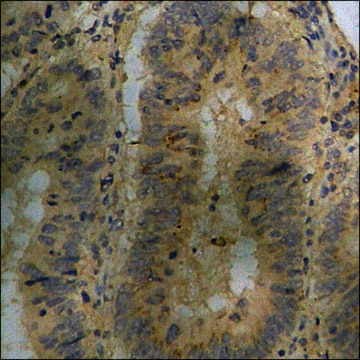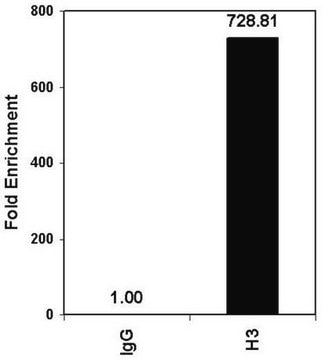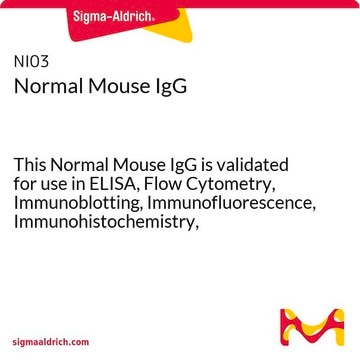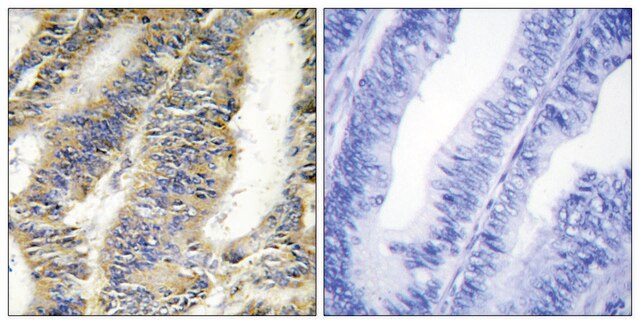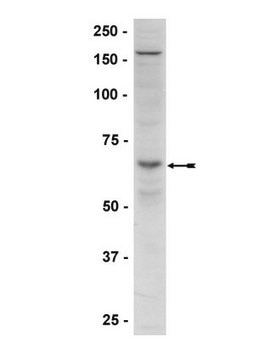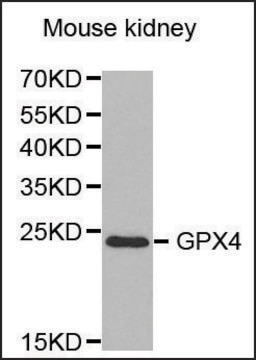17-655
ChIPAb+ Nanog Antibody - ChIP Validated Antibody and Primer Set
from mouse
Synonym(s):
homeobox protein NANOG, homeobox transcription factor Nanog, hNanog
Sign Into View Organizational & Contract Pricing
All Photos(2)
About This Item
UNSPSC Code:
12352203
eCl@ss:
32160702
NACRES:
NA.75
Recommended Products
Related Categories
General description
All ChIPAb+ antibodies are individually validated for chromatin precipitation, every lot, every time. Each ChIPAb+ antibody set includes control primers (tested every lot by qPCR) to biologically validate your IP results in a locus-specific context. The qPCR protocol and primer sequences are provided, allowing researchers to validate ChIP protocols when using our antibody in their chromatin context. Each set also includes a negative control antibody to ensure specificity of the ChIP reaction.
The ChIPAb+ Nanog set includes a Nanog antibody, a Normal Mouse IgG, and positive control primers which amplify a 81 bp of human miR-302 cluster promoter region. The Nanog antibody and negative control IgG are supplied in a scalable "per ChIP" reaction size and can be used to functionally validate the precipitation of Nanog associated chromatin
The ChIPAb+ Nanog set includes a Nanog antibody, a Normal Mouse IgG, and positive control primers which amplify a 81 bp of human miR-302 cluster promoter region. The Nanog antibody and negative control IgG are supplied in a scalable "per ChIP" reaction size and can be used to functionally validate the precipitation of Nanog associated chromatin
Application
Chromatin Immunoprecipitation:
Sonicated chromatin prepared from Ntera-2 cells fixed for 15 min (1e5 cell equivalents per IP) were subjected to chromatin immunoprecipitation using 3 µg of either Normal Mouse IgG (Part No. CS200621), or 3 µg Anti-Nanog (Part No. CS207343) and the Magna ChIP HiSens (Cat. # 17-10460). Successful immunoprecipitation of Nanog associated DNA fragments was verified by qPCR using ChIP Primers, miR-302 (Part No. CS207380) as a positive locus, and Nanog minus 10 kb primers as a negative locus. Data are presented as percent input of each IP sample relative to input chromatin for each amplicon and ChIP sample as indicated.
Please refer to the Magna ChIP HiSens (Cat. # 17-10460) or EZ-MagnaChIP HiSens(Cat. # 17-10461) protocol for experimental details.
Chromatin Immunoprecipitation:
Sonicated chromatin prepared from Ntera-2 cells fixed for 15 min (1e4, 1e5 and 1e6 cell equivalents per IP) were subjected to chromatin immunoprecipitation using 3 µg of either Normal Mouse IgG (Part No. CS200621), or 3 µg Anti-Nanog (Part No. CS207343) and the Magna ChIP HiSens Kit (Cat. # 17-10460). Successful immunoprecipitation of Nanog associated DNA fragments was verified by qPCR using ChIP Primers, miR-302 (Part No. CS207380.
Please refer to the MagnaChIP HiSens (Cat. # 17-10460) or EZ-MagnaChIP HiSens (Cat. # 17-10461) protocol for experimental details.
Western Blotting Analysis:
0.5 µg/mL of this antibody detected NANOG on 10 µg of H9 human embryonic stem cell lysate.
Immunocytochemistry Analysis:
A 1:500 dilution from a representative lot detected NANOG in H9 human embryonic stem cells.
Sonicated chromatin prepared from Ntera-2 cells fixed for 15 min (1e5 cell equivalents per IP) were subjected to chromatin immunoprecipitation using 3 µg of either Normal Mouse IgG (Part No. CS200621), or 3 µg Anti-Nanog (Part No. CS207343) and the Magna ChIP HiSens (Cat. # 17-10460). Successful immunoprecipitation of Nanog associated DNA fragments was verified by qPCR using ChIP Primers, miR-302 (Part No. CS207380) as a positive locus, and Nanog minus 10 kb primers as a negative locus. Data are presented as percent input of each IP sample relative to input chromatin for each amplicon and ChIP sample as indicated.
Please refer to the Magna ChIP HiSens (Cat. # 17-10460) or EZ-MagnaChIP HiSens(Cat. # 17-10461) protocol for experimental details.
Chromatin Immunoprecipitation:
Sonicated chromatin prepared from Ntera-2 cells fixed for 15 min (1e4, 1e5 and 1e6 cell equivalents per IP) were subjected to chromatin immunoprecipitation using 3 µg of either Normal Mouse IgG (Part No. CS200621), or 3 µg Anti-Nanog (Part No. CS207343) and the Magna ChIP HiSens Kit (Cat. # 17-10460). Successful immunoprecipitation of Nanog associated DNA fragments was verified by qPCR using ChIP Primers, miR-302 (Part No. CS207380.
Please refer to the MagnaChIP HiSens (Cat. # 17-10460) or EZ-MagnaChIP HiSens (Cat. # 17-10461) protocol for experimental details.
Western Blotting Analysis:
0.5 µg/mL of this antibody detected NANOG on 10 µg of H9 human embryonic stem cell lysate.
Immunocytochemistry Analysis:
A 1:500 dilution from a representative lot detected NANOG in H9 human embryonic stem cells.
Research Category
Epigenetics & Nuclear Function
Nuclear Function
Epigenetics & Nuclear Function
Nuclear Function
Use ChIPAb+ Nanog ChIP Validated mouse monoclonal antibody for the detection of Nanog.
Packaging
25 assays per set. Recommended use: 3.0 μg of antibody per chromatin immunoprecipitation (dependent upon biological context).
Quality
Chromatin Immunoprecipitation:
Sonicated chromatin prepared from Ntera-2 cells fixed for 15 min (1e5 cell equivalents per IP) were subjected to chromatin immunoprecipitation using 3 µg of either Normal Mouse IgG (Part No. CS200621), or 3 µg Anti-Nanog (Part No. CS207343) and the Magna ChIP® HiSens Kit (Cat. # 17-10460). Successful immunoprecipitation of Nanog associated DNA fragments was verified by qPCR using ChIP Primers, miR-302 (Part No. CS207380).
Please refer to the MagnaChIP HiSens (Cat. # 17-10460) or EZ-MagnaChIP HiSens (Cat. # 17-10461) protocol for experimental details.
Sonicated chromatin prepared from Ntera-2 cells fixed for 15 min (1e5 cell equivalents per IP) were subjected to chromatin immunoprecipitation using 3 µg of either Normal Mouse IgG (Part No. CS200621), or 3 µg Anti-Nanog (Part No. CS207343) and the Magna ChIP® HiSens Kit (Cat. # 17-10460). Successful immunoprecipitation of Nanog associated DNA fragments was verified by qPCR using ChIP Primers, miR-302 (Part No. CS207380).
Please refer to the MagnaChIP HiSens (Cat. # 17-10460) or EZ-MagnaChIP HiSens (Cat. # 17-10461) protocol for experimental details.
Physical form
Anti-Nanog (Mouse Monoclonal), Part No. CS207343. One vial containing 110 µL (0.7 mg/mL) purified mouse monoclonal in buffer containing 0.1 M Tris-Glycine (pH 7.4),150mM NaCl, and 0.05% sodium azide, before the addition of 30% glycerol. Store at -20°C.
Normal Mouse IgG, Part No. CS200621. One vial containing 125 μg of purified mouse IgG in 125 μL storage buffer containing 0.1% sodium azide. Store at -20°C.
ChIP Primers, miR-302. Part No. CS207380. One vial containing 75 μL of 5 μM of each primer specific for human miR-302 cluster promoter region (chr4:113570181-113570261, hg19 build). Store at -20°C.
FOR: CCC GTG GAA GCA ATC TAT TTA TTT
REV: TGT GTT TCT ATC TGG AGG AAC TCT GT
Normal Mouse IgG, Part No. CS200621. One vial containing 125 μg of purified mouse IgG in 125 μL storage buffer containing 0.1% sodium azide. Store at -20°C.
ChIP Primers, miR-302. Part No. CS207380. One vial containing 75 μL of 5 μM of each primer specific for human miR-302 cluster promoter region (chr4:113570181-113570261, hg19 build). Store at -20°C.
FOR: CCC GTG GAA GCA ATC TAT TTA TTT
REV: TGT GTT TCT ATC TGG AGG AAC TCT GT
Format: Purified
Analysis Note
Control
Includes normal mouse IgG and primers specific for human miR-302 cluster promoter region.
Includes normal mouse IgG and primers specific for human miR-302 cluster promoter region.
Other Notes
Concentration: Please refer to the Certificate of Analysis for the lot-specific concentration.
Legal Information
MAGNA CHIP is a registered trademark of Merck KGaA, Darmstadt, Germany
UPSTATE is a registered trademark of Merck KGaA, Darmstadt, Germany
wgk_germany
WGK 1
Certificates of Analysis (COA)
Search for Certificates of Analysis (COA) by entering the products Lot/Batch Number. Lot and Batch Numbers can be found on a product’s label following the words ‘Lot’ or ‘Batch’.
Already Own This Product?
Find documentation for the products that you have recently purchased in the Document Library.
Our team of scientists has experience in all areas of research including Life Science, Material Science, Chemical Synthesis, Chromatography, Analytical and many others.
Contact Technical Service
